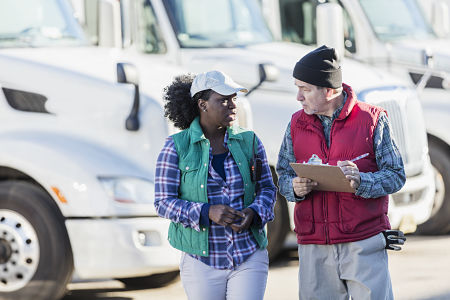Understanding Cargo Insurance: What Every Truck Driver Should Know?
No matter the size of your trucking company, the key goal is to ‘maintain the safety of cargo during haul’ and earn big profits. However, the route to accomplish this objective is not smooth sailing. Here, understanding cargo insurance and how it safeguards your trucking and freight is vital!
In the world of trucking, it is common to move different sorts of cargo from one point to another. About 53.6 million tons of cargo valued at over $54 billion was moved in 2021.
Although truckers put their best foot forward in ensuring cargo safety, unpredicted risks like thefts, accidents, and weather conditions can disrupt the entire operation. Plus, even the most well-rounded truckers can make mistakes during the hauling session.
A single wrong move can cause massive damage to the cargo. Whether the shipment value is high or low, if this happens recurrently, it can take a toll on your trucking business’s reputation and cause a significant drag on your profit graph.
Making profits in trucking is directly related to the safety of the shipment until it reaches its destination. Fortunately, with coverage like cargo insurance, you can pay for the freight damages that occur during the transportation. Not only this, there a several aspects of cargo insurance that every trucker should know.
In this post, we will navigate you through what this coverage includes, its cost, its importance, and everything that would make understanding cargo insurance easy.
Let’s dive into its gory details!
But first, let’s take a look at how cargo loss impacts a trucking business’s finances.
Table of contents
- Financial Impact of Cargo Loss on a Trucking Business
- What is Cargo Insurance? Why Is This Coverage Important For Truckers?
- What Does Cargo Insurance Cover?
- What Risks are Not Covered in Cargo Insurance?
- What Is the Cost of Cargo Insurance?
- How to Expedite the Cargo Insurance Claiming Process?
- Frequently Asked Questions on Understanding Cargo Insurance
- The Bottomline
Financial Impact of Cargo Loss on a Trucking Business
The cost of cargo damage or loss can be enormous for a trucker. As far as cargo damages are concerned, 14% occur to due incorrect temperature (temperature-sensitive freight), 9% are theft-related, 25% are physical, and 20% are for other reasons.
According to NCSC (National Cargo Security Council), the financial impact of cargo damage/loss crosses $50 billion per year. If a trucking company happens to damage cargo worth $100000, it would need an additional $1.46 million in sales to cover this loss.
This is where cargo insurance kicks in. Although this coverage is not law-mandated, to minimize the financial impact of cargo loss on a trucking company, shipment insurance is what all truckers need.
Want to insure your fleets? Get free truck insurance quote now.


What is Cargo Insurance? Why Is This Coverage Important For Truckers?


Cargo insurance offers coverage against the risks of loss or damage of freight during transportation. No matter who is at fault, an unforeseen loss or damage to the cargo in the move can cost a fortune to the truckers. This cost can be a replacement expense or cleaning up the site. This coverage is designed for truckers involved in the transportation of different sorts of goods.
Therefore, if you haul people’s goods from one point to another, cargo insurance is a policy that you must obtain for smooth operation. This is because many things can go wrong while handling the goods. It can get destroyed by fire, crash, explosion or get lost due to theft or vandalism, or even worse.
In such circumstances, cargo insurance offers you a financial cushion to pay off the losses that occurred to the freight. The potential for bearing huge cargo losses has led many truckers to insure the freight with adequate coverage.
If you are still not satisfied with the cargo insurance definition, we are sure that the importance of this coverage will:
Compensates For Loss
Trucking is a risky business. You deal with likely and unlikely risks while hauling the freight. No matter what precautionary measures or safety tips a trucker applies while driving, cargo that is on the move is prone to various risks. If your cargo gets impacted in an accident or crash, shipment insurance helps you compensate for the losses you have suffered.
Minimize The Impact
Cargo damage or loss comes with a heavy cost that you need to pay to your customers. Even one single incident can put a hiatus on your trucking operations. Although you have no control over unforeseen incidents, with cargo insurance you can minimize the financial impact on your trucking business.
Risks Coverage
Cargo insurance protects the freight against significant risks. External factors such as theft, improper handling, fire, vandalism, etc. are covered in cargo insurance.
Added Layer of Protection
While there is no control over unforeseen circumstances, adequate cargo insurance adds a layer of protection to the entire hauling session. Even if any sort of damage is caused to the cargo, the coverage will step in, pay for the loss, and your trucking will be back on track without any delays and costly downtime.
Peace of Mind
When the shipment is on the move, in the back of their minds truckers know that they have coverage that will provide a financial cushion if anything goes wrong during the haul. Securing cargo offers peace of mind as you know that your shipment is safe.
Improved Reputation
When you take cargo coverage, your customers know that you value their assets. This enhances the reputation of your trucking company. As a result, you earn more loyal customers.
Warehouse to Warehouse
Cargo insurance also protects the likely and unlikely damages happening to the freight when getting transported from one warehouse to another.
What Does Cargo Insurance Cover?
Truckers should understand what type of risks are covered in cargo insurance. This coverage offers protection against cargo damages that are caused by:
- Natural disasters like earthquakes, floods, volcanic eruptions, etc.
- Collision, road inconvenience, overturning, etc.
- Loading, handling, and unloading.
- Acts of war, riots, and civil commotions.
- Theft, fire, explosion, vandalism, etc.
- Inadequate marking and labeling.
What Risks are Not Covered in Cargo Insurance?
Cargo insurance helps truckers in covering the damages of shipments they carry. However, not all cargo insurance covers all the risks that freight is exposed to during the haul. Here is the list of items or circumstances that are excluded from cargo insurance.
- Flawed products: If the cargo that has been damaged due to a flaw or fault is not covered in this goods insurance.
- Poor packaging leading to damage: If the good damage is caused due to poor packaging, then this type of loss is not covered by cargo insurance.
- Perishable goods: Goods that are perishable in nature like seafood, meat, dairy products, etc. are not covered in cargo insurance.
- Special cargo: Cargoes that are highly valuable, expensive, or hazardous are not covered by cargo insurance. This is because truckers need special coverage like hazmat insurance to protect their operations if they are hauling hazardous materials.
What Is the Cost of Cargo Insurance?
First, the type of cargo that you transport plays an important role in deciding the actual cost of your freight insurance. Risky cargo such as expensive electronics, valuable items, or hazardous materials have comparatively higher premium rates than hauling general shipments.
Secondly, the value of cargo is another important aspect that is factored in while determining the total policy cost. If the value of cargo is high, the price of covering it will also go up.
Third, the limit of coverage that you opt for also affects the cost of cargo insurance. The higher the limit, the higher the price will be. On average, the cargo limit ranges between $20000 to $100000. For instance, a household mover in California is required to carry a minimum of $20000 to get the PUC (pollution under control) authority.
Fourth, the history of claims and the precautionary measures that you take during the operations also impact the cost of cargo insurance. If you have maintained a good safety record and you are not a frequent claimer, then your cargo policy premium will be low and vice versa.
As of 2023, the average cost of commercial cargo insurance with a limit of $100000 ranges between $400 to $600 annually. The limit for truckers hauling electronics can go up to $250000.
Now this was all about cargo insurance. So, when you obtain this coverage and your cargo actually gets damaged on the move, what then?
Here is the step-by-step process for claiming cargo insurance.
How to Expedite the Cargo Insurance Claiming Process?
The key purpose of obtaining cargo insurance is to get the coverage for loss ASAP whenever the requirement arises right?
The below table shows the four major steps that need to be taken to expedite the cargo insurance claiming process and get the settlement.
| Steps | Actions To Be Taken |
| Inspect the condition of the cargo for damage. | Thoroughly check all the damages that happened to the cargo. See if there is anything missing from the lot. |
| Get ready with the consignment note. | If you discover theft or damage to the cargo, record this in the consignment note as a claim. |
| Take pictures of the cargo damage. | Take clear photos of the damages that has happened to the cargo. You will be required to present it as evidence of damage or theft during the claim process. |
| Submit the claim letter. | Fill out the claim letter properly and submit it to your insurance provider for the settlement. |
Once your insurance provider is intimated for the claim settlement, the following procedures take place.
Insurance Company is Notified
Once you discover the damages or loss of cargo, your insurance provider is notified about the situation.
Surveyor Appointment
Once the insurance company is notified, they delegate the damage or loss assessment to the surveyor. This personnel inspects the damages or loss of cargo that you have mentioned in the notification and prepares a detailed report that contains the extent of shipment loss or damage.
Proof and Claim Form Submission
Once the surveyor prepares the report, you need to organize all the proofs that you have gathered at the time of the incident like pictures in one place. You will now submit this surveyor report along with all the necessary evidence to support your cargo insurance claim.
Monetary Claim Filing
If the cargo is lost or missing due to theft or other reasons, you need to file a monetary claim with your insurance company and get acceptance for the same.
Claim Approval
Once the insurance company receives all the supporting documents along with evidence, they review your claim and check that it aligns with your cargo insurance coverage. If the claim gets approved, the company issues a settlement check. On the other hand, if the claim gets rejected, they will inform you of the reason.
Legal Alternative (If Needed)
Lastly, if you feel that the settlement is unsatisfactory or the claim gets rejected, you can take legal action and approach the court to seek help.
Want to insure your fleets? Get free truck insurance quote now.


Frequently Asked Questions on Understanding Cargo Insurance
Several techniques can help you lower your cargo insurance rates including increasing deductibles, working on risk reduction, etc.
Cargo insurance is available for dump trucks, flatbeds, car haulers, cement mixers, tractors, cargo vans, box trucks, tractors, and most trailers.
Hazardous materials, expensive/valued items, regular commodities, etc. are covered in freight insurance.
The most typical risk inclusions in cargo insurance are theft, act of war, collision, natural disaster, fire, etc.
Tobacco, alcohol, explosives, pharmaceuticals, money, jewelry, paper, etc. are not covered in cargo insurance.
Cargo insurance is not available for ice cream trucks, buses, garbage trucks, limousines, passenger vans, etc.
Although cargo insurance coverage is non-mandated, truckers who transport different types of cargo from one point to another should obtain this policy for shipment safety.
The Bottomline
Cargo damage is one of the biggest risks in the trucking industry. Shipment can be broken, stolen, damaged, contaminated, or exposed during the haul. Although there is no mandatory requirement for cargo insurance, your business does need this coverage.
Understanding cargo insurance and why every truck driver should know about this policy is vital in this business.
To sum it up, cargo insurance acts as armor that protects your valuable shipment on the move. Let us help you customize the best and most affordable motor truck cargo insurance for you.






